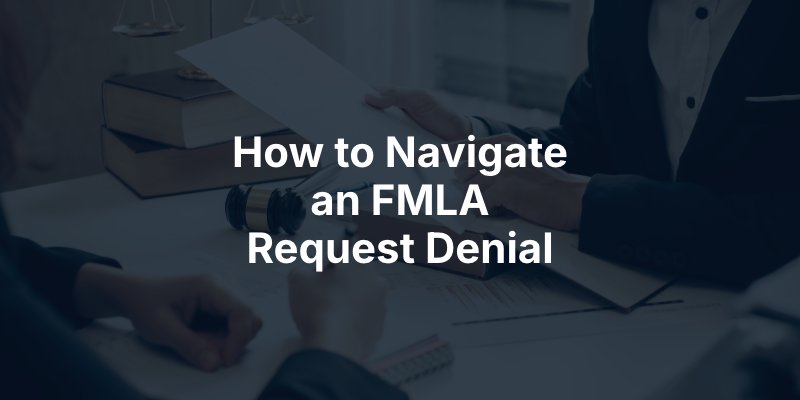If your Family and Medical Leave Act (FMLA) request is denied in California, you have legal options. An Orange County FMLA attorney can help you navigate them.

Steps to Take After a Denial
- Request a Written Explanation: Ask your employer for a detailed reason for the denial. This will help you understand their rationale and prepare for any necessary appeals.
- Review Your Eligibility: Ensure you meet all FMLA requirements, including employment duration, hours worked, and the nature of your leave request.
- Provide Additional Documentation: If the denial is due to insufficient information, submit any missing or additional documentation required.
- Speak to Human Resources: Sometimes, misunderstandings can be resolved through internal discussions.
- Speak to an Employment Attorney: Consulting an employment attorney in Orange County can provide clarity on your rights and the strength of your case. They can also guide you through the process, help gather necessary documentation, and represent you in any legal proceedings.
- File a Complaint: If internal resolution fails, you can file a complaint with the U.S. Department of Labor’s Wage and Hour Division or the California Department of Fair Employment and Housing (DFEH). These agencies can investigate and enforce FMLA and CFRA rights.
File a Lawsuit
If necessary, you can file a lawsuit against your employer for an unlawful FMLA denial. Additional reasons include:
- If you faced adverse actions, such as demotion or termination, for requesting or taking leave;
- Your employer did not reinstate you to your original or an equivalent position after your leave; or,
- Your employer interfered with, restrained, or denied your rights under FMLA.
Potential remedies include reinstatement, back pay, and compensation for damages.
Common Reasons for Denial
Employers may deny FMLA leave for several reasons:
- Ineligibility: You must have worked for your employer for at least 12 months and logged 1,250 hours in the past year.
- Employer Size: FMLA applies to employers with 50 or more employees within a 75-mile radius.
- Non-Qualifying Reason: FMLA covers specific situations like serious health conditions, childbirth, or caring for a family member with a serious health condition.
- Insufficient Documentation: Employers can request medical certification to validate the need for leave.
An employer must provide a valid reason for denying your request.
What Are My Rights Under FMLA?
Under the Family and Medical Leave Act (FMLA), eligible employees are entitled to specific rights designed to balance work and family responsibilities.
Here’s an overview of your FMLA rights:
Job-Protected Leave
Eligible employees can take up to 12 workweeks of unpaid leave within a 12-month period for qualifying reasons, including:
- The birth and care of a newborn child.
- Placement of a child for adoption or foster care.
- Caring for an immediate family member (spouse, child, or parent) with a serious health condition.
- The employee’s own serious health condition that makes them unable to perform their job functions.
- Certain circumstances related to a family member’s military service.
Additionally, eligible employees may take up to 26 workweeks of leave in a single 12-month period to care for a covered servicemember with a serious injury or illness.
Continuation of Health Benefits
During FMLA leave, your employer must maintain your group health insurance coverage under the same terms as if you had continued working.
Restoration to the Same or Equivalent Position
Upon returning from FMLA leave, you have the right to be reinstated to your original job or an equivalent position with the same pay, benefits, and other employment terms.
Protection Against Retaliation
Employers cannot retaliate against employees for taking FMLA leave or for filing a complaint related to FMLA violations.
Intermittent Leave
FMLA leave can be taken intermittently or on a reduced leave schedule when medically necessary.
Notice Requirements
When the need for FMLA leave is foreseeable, you must provide your employer with at least 30 days’ advance notice.
Contact our firm today to set up a free legal consultation.
